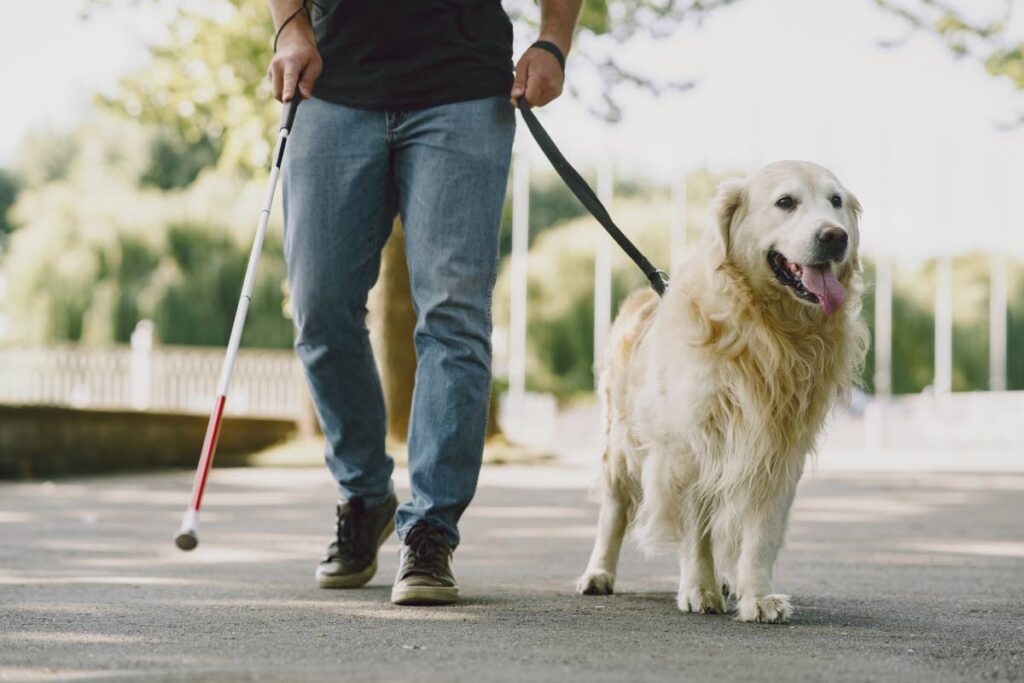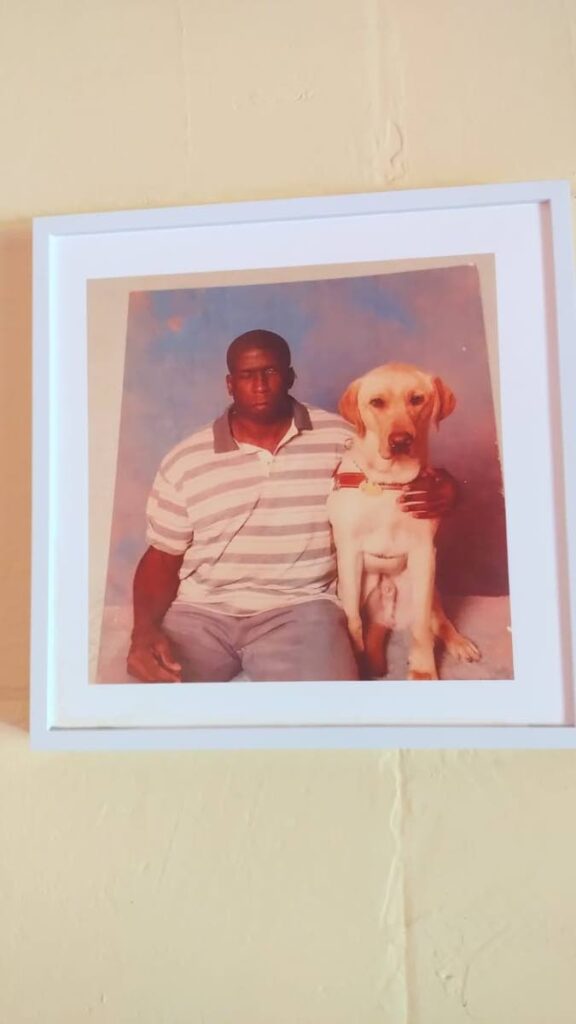Opening door for service animals in Trinidad and Tobago

A man walks into a bar...with his service animal. The beginning of that sentence is pretty common in TT, but in its entirety, not so much.
In many countries, service animals are allowed into banks, hotels, restaurants, among other places. However, in TT, most businesses have no set policies.
Service animals – usually dogs – are trained to assist people with disabilities or diseases that can threaten their physical well-being. Miniature horses may also be service animals.
These trained and certified animals can be used as as guides for the blind, alert deaf people of possible danger, help someone who is having a seizure, assist someone in a wheelchair, or help a diabetic patient who is experiencing issues caused by fluctuating blood sugar levels, among other things.
They are not to be confused with emotional support animals, which can be any domesticated animal that provides therapeutic relief to people with psychiatric problems.
In 2015, then minister of food production Devant Maharaj introduced a policy allowing service animals to enter government buildings. The inspiration behind this, he said then, was a project by students at UWI, St Augustine's optometry department.
The group pitched the idea of a TT Guide Dog Association, which was eventually created but had a very short lifespan.
Maharaj also arranged the procurement of equipment for maintaining the dogs and waived the 15 per cent VAT and 40 per cent customs duty for importing it.
The association imported four dogs, but finances became a challenge and it was dissolved. No dogs were ever trained.
One past member told Sunday Newsday the cost of trainers was too high, despite repeated fundraisers. A service dog can cost between US$15,000 and US$50,000.
The Blind Welfare Association (BWA) said there have been four seeing-eye/guide dogs in TT to date.
Over two decades ago, Maureen Ramroop became the first person in TT to own one – Patches, a golden retriever.
In a recent Newsday column by animal welfare activist Elspeth Duncan, Ramroop said Patches was "a real guinea pig" and got "real blows from all of the adversaries in terms of being accepted as a guide dog."
At the time, she said, TT culture did not recognise guide dogs, but wondered if continued public education could have changed this.
Extempo veteran Joseph "Lingo" Vautor La Placeliere had Kokua, a yellow labrador, some 18 years ago. They worked together for ten years.
He said his biggest challenge was public transport.
"The drivers in, for example, the PTSC (Public Transport Service Commission) buses, if they say they don't want the dog on the bus, I couldn't do anything about it."
He said they once tried to board the inter-island ferry,but employees refused to let them. But the captain, an American, said he didn't see a problem and scolded the employees. But even on board, staff members demanded they remain in one spot and not move around the ferry.
Over the years, they were able to enter a few buildings, including the Hyatt Regency and President's House. However, he believes he may have got special treatment, as he was a known entertainer.

The overall experience of having a service dog taught him "a new type of responsibility.
"It was challenging but it was enjoyable as well."
The only problem he had with Kokua was: "He was so vain, whenever he saw his reflection in the mirror, he had to stop and take a good look at himself.
"Now, I not seeing, so I don't know what he's looking at, (but people told me)," he recalled, laughing.
Handicraft instructor Leon George also owned a yellow labrador, Henry, whom he had for 12 years.
He said Henry was "very social" and did not like to be left alone.
"I couldn't go out with him as I would have liked to (because of restrictions)."
But Henry helped him explore new places.
"In Santa Cruz, there were some streets without sidewalks in one particular area. I had never gone there before Henry."
Henry was so loving, George said, that "even if I just had a cough, he would come up and try to make sure I am okay."
George urged businesses to understand that having a service dog is not a privilege, but a right.
"Regular rules for pets should not apply for these dogs...I think a lot of sensitisation has to be done on this as well. You can't just wake up in the morning and make a law and everything will work out.
Radio personality Anthony "Storming" Tom had Taz, a golden retriever, for at least five years.
While he loved the time he spent with Taz, he said, "Using him in TT was practically impossible, because there were not the necessary laws to allow for his use.
"I mainly had to use him in the neighbourhood. I couldn't bring him to work, I couldn't take him on taxis – drivers were not super-understanding with that and were very unco-operative."

It was only when he visited the US that he had the true experience of owning and using a guide dog.
"It was amazing how these dogs just knew what to do from the time they were in a situation or environment where they could operate."
Taz was very brave and outgoing, he said.
"There are areas I would be timid to venture and he would pull me around, almost like if he was saying, 'Aye. I am the one who could see here, so let's roll.'
"He was very obedient, even when being corrected. He aimed to please his master and made sure he was safe, and if ever he should do something to compromise that, he was apologetic," he added.
Tom felt Taz's potential was wasted, and called for a culture shift in TT on service animals.
"People must understand that for some, without these service animals, people are literally immobile.
"Having a cane is one thing, but (it is nice) having a service animal alert you to when you're approaching a staircase, elevator or obstacle...
"It feels terrible (that he was wasted)."
The BWA said many people want service dogs, but the limitations in TT continue to dissuade them.
BUSINESS POLICIES
Caribbean Airlines (CAL) currently allows service animals on flights. The animals cannot use a seat but must sit at the passenger's feet and must not protrude into the aisles. Proof of vaccination must also be provided.
The Housing Development Corporation (HDC) only allows pets at single-unit homes, not apartment complexes or townhouses. Asked for the corporation's policy on service animals, its chairman Noel Garcia told Sunday Newsday there isn't one, but people can apply for special provisions to be made to accommodate service animals.
Supermarket Association (SATT) president Rajiv Diptee said allowing animals in businesses could improve inclusion in TT. However, he said it would have to be considered from multiple perspectives and guided by protocols.
"We have to look at health, for instance, when it comes to cross-contamination...
"I think it has to be approached step-wise," he said, adding that the "same formula" wouldn't work for every business.
He said a partnership between SATT and the BWA could be considered.
"Maybe we could look at certain days that we can accommodate (people with service animals) in the store, perhaps hire extra staff to facilitate additional cleaning, have marked lanes...
"We are always willing to expose possibilities for socially positive outcomes. It would take all stakeholders to have a discussion, and it wouldn't take too much to put into place."
Satesh Moonasar, president of the Barkeepers and Owners Association, said it's possible for outdoor bars and perhaps larger, enclosed ones. He said he would ensure there are discussions within the association on this, as "everyone deserves to feel included."
The PTSC said it does not have a policy but is "looking into developing one.
"We are also very open to having consultative meetings with the relative stakeholders on this."
Regency Recruitment & Resources Ltd in Port of Spain allows service dogs, clearly indicated by a sticker on the building. Its chairman, Lara Quentrall-Thomas, is originally from England, and said it's "a very common thing" there.
"You'd see them in hospitals, schools, workplaces..."
She said it is important that both private and public sectors collaborate to help make TT more inclusive.
"These are trained animals. They aren't wild animals running through your business."
She said the lack of policies in TT is a "chicken and egg" situation, as on one hand, service animals aren't common here, so many people may not see the need for policies, but on the other hand, people may not be creating policies because they don't see service animals being used.
The Bankers Association of TT said its member banks will "make their best efforts to accommodate differently-abled customers in bringing their appropriately controlled service or guide animals on our premises while they conduct their banking.
"An appropriately authorised support person will also be welcome to accompany our differently-abled customer/person while conducting business, in line with existing privacy requirements," it said.
Newsday contacted some restaurants, but the owners were hesitant to comment until they found out more information about the public health ordinance. However, Trotters Restaurant Group CEO Peter George said the issue can be looked at once appropriate guidelines are implemented and followed.


Comments
"Opening door for service animals in Trinidad and Tobago"